- Home
- Steven Ehrman
The Lambs Lane Affair (A Sherlock Holmes Uncovered Tale Book 5)
The Lambs Lane Affair (A Sherlock Holmes Uncovered Tale Book 5) Read online
The Lambs Lane Affair
Sherlock Holmes Uncovered
Steven Ehrman
Copyright © 2014 Steven Ehrman
All rights reserved.
ISBN:1494716232
ISBN-13:978-1494716233
DEDICATION
To my father.
DEDICATION
Works by the Same Author
Chapter One
Chapter Two
Chapter Three
Chapter Four
Chapter Five
Chapter Six
Chapter Seven
Chapter Eight
Chapter Nine
Chapter Ten
Chapter Eleven
Chapter Twelve
Chapter Thirteen
Chapter Fourteen
Chapter Fifteen
Chapter Sixteen
Chapter Seventeen
Works by the Same Author
The Sherlock Holmes Uncovered Tales
The Eccentric Painter
The Iron Dog
The Mad Judge
The Spider Web
The Lambs Lane Affair
The Rising Minister
Coming soon – Robin Hood’s Revenge
The Frank Randall Mysteries
The Referral Game
The Visible Suspect
The Zombie Civilization Saga
Zombie Civilization: Genesis
Zombie Civilization: Exodus
Chapter One
I found myself growing somewhat ill at ease as I sat in the rooms I shared with Sherlock Holmes at 221B Baker Street. Holmes, while never the most convivial of men, had been particularly moody and could not be drawn into conversation. I was used to the taciturn nature of the great detective, but he had become positively surly over the past week.
As I was reading a collection of the poems of Lord Byron, I was startled by my friend slapping the arm of his chair in frustration. I was never an aficionado of the Romantic era poets and was glad for the distraction. Holmes looked up at me and wryly smiled.
“I apologize, Doctor, for disturbing you,” said he. “But I know for a fact that you only read Byron when you are recalling the Newfoundland hound of your youth.”
I willingly put down the volume to reply.
“So the new day finds you in a communicative mood, Holmes?” I asked. “It has been some few days since I have received a civil reply to any greeting.”
“And again, I apologize. This Masterson counterfeiting case has me thoroughly flummoxed. He is a clever man I will grant you, but I will corner him yet.”
I was always somewhat surprised whenever Holmes confessed to being out of his depths. In our association he had solved so many cunning mysteries that I thought him incapable of failure, yet I knew in my heart this was not true.
“Perhaps, Holmes,” I essayed, “I could be of some aid to you in this matter. Besides the bare necessities, I know nothing of the case, but I have some slight experience in detection, as you know.”
Holmes was lighting a pipe as I spoke, and he was soon billowing smoke into the air. It was fortunate that it was a temperate month, as otherwise our lodgings could become quite poisonous from the pungent tobacco Holmes employed.
“I have considered that, Doctor,” he said in a contemplative manner. “But I am afraid that the details of the case are quite above your station, and you would be of little use.”
I was well acquainted with Holmes’s lack of social skills, but even I was taken aback by his brutal comment. If it was true that I did not possess the mind of the great detective, I had aided him materially many times. My dismay must have plainly showed across my face as Holmes quickly moved to soften the blow.
“It is not my intent to demean your intelligence, old friend; it is simply that the case is quite technical, and the effort it would take to acquaint you with the facts would not be worth the effort. What is needed is someone to whom facts and figures are second nature. Such a person might indeed be of aid.”
“Why, Holmes,” said I. “You have drawn a portrait of someone that you know well. Can you not see the solution? Whom have you just described?”
I saw a trace of concentration cross his brow and his face soon broadened into a smile.
“Why, Watson, as soon as I declare that you cannot help me in this matter, you demonstrate the common sense that does you credit.”
Praise was not often coming from Holmes and I allowed myself to bask, for a moment, in the knowledge that I had laid out a solution to his problem that had vexed him for the past week.
“Well, Holmes, a glance at the clock shows that it is nearly five,” I said. “Our quarry is safely ensconced in his den by now, if history is any guideline, so perhaps we should be off.”
Holmes arose from his chair and clapped me on the shoulder in a gesture of camaraderie. We were soon down the seventeen steps of our home, and after a quick word to Mrs. Hudson, we found ourselves on Baker Street.
The solution that had been obvious to me, and obvious to Holmes as well once broached, was that we should lay the vexing counterfeit problem at the feet of the brother of my friend, Mycroft.
I had been unaware of the existence of any family members that Holmes had before the affair of the Greek Interpreter. It had been vaguely in my head that since Holmes was reticent in the extreme about discussing his antecedents, he simply did not have any. I was greatly surprised at his bland description of a brother who lived a scant few miles away in Pall Mall.
This brother, Mycroft Holmes, was a man of most eccentric habits, even for a close relation of Sherlock Holmes. Holmes had vaguely told me that Mycroft was employed by the government in a position of auditing the books of various departments. He seemed unwilling to go into the matter any deeper and I was loath to pursue it further in the face of his disinclination.
Mycroft belonged to, and indeed helped found, one of the most singular clubs in all of London. The Diogenes Club was located near Mycroft’s rooms in Pall Mall and was an association of the most non-congenial men in existence. Conversation was forbidden in the club, save for the Stranger’s Room, and any man who was so incommodious to his fellow members as to break this code three times became a former member at once. To all observance the club seemed to be no different than any other club of like-minded men in the city. It was filled with comfortable armchairs, cheery fireplaces, and the papers and periodicals of the day.
Holmes’s brother was a patron of the club on a daily basis and could be found there, without fail, every day between the hours of a quarter to five and twenty past eight.
It was an unusually warm fall day and dusk had already begun as Holmes and I walked arm in arm down the crowded sidewalks of the city, passing by all the inhabitants that came our way. Holmes would occasionally deduce the trade of those we would encounter in this manner, but today I saw his brow knitted in concentration and his eyes fiery with anticipation of discussing the case with his brother.
Once upon St. James we saw Pall Mall hove into view and crossed over to it. It was only a short walk from there to the Diogenes Club. Holmes left me in the Stranger’s Room and went in search of his brother. I seated myself in a well-upholstered chair and perused the latest issue of Punch. I had not gotten through the first page when Holmes reappeared with his brother.
Mycroft Holmes was alike and yet not alike to his brother. Facially there was an undeniable resemblance, most especially about the alert and intelligent eyes, but in body type Mycroft was the polar opposite of the trim and spare Holmes. He was a fleshy man, over six feet in height, and moved with a ponder
ous reluctance that advertised his sedentary nature. Holmes had always made it a point to explain to me that Mycroft possessed the same gift of deduction that he enjoyed and to a greater degree. I was somewhat reluctant to believe this, but as false modesty was not a trait that my old friend evinced in any measure, I was inclined to believe him. Mycroft crossed the room and held out a fleshy hand to me. I shook it and he lowered his bulk into a seat adjacent to mine and sat in repose.
“I suppose, Sherlock, that this visit means you are out of your depths again,” he said through hooded and languid eyelids.
Mycroft was the elder brother by some seven years and I had noted on previous occasions that he had a distinctly paternal manner of speaking to his younger sibling. Holmes merely smiled at the slight superiority of tone his brother employed.
“Now, Mycroft, you do not seriously suggest that I have never on any occasion visited you without ulterior motive?”
“Of course not, my boy,” said Mycroft. “And in any case, I enjoy the intellectual challenge of a mysterious case as much as do you. It is only that I am not inclined to race about the country to prove my theories correct. Indeed, Sherlock, you have been given more than your share of intellect and prowess and I daresay you only require my aid in times of great need. Now tell me. Is there a case at hand?”
In answer Holmes drew a sheaf of papers from his jacket pocket.
“So it’s the Masterson counterfeiting case, is it,” he stated rather than asked. “I had thought you might be around with that one, Sherlock.”
Holmes read the question on my face.
“My dear doctor, Mycroft was able to deduce that it was on the Masterson case by the simple fact that it was he who suggested that the Crown seek my help in the matter.”
“That is so,” said the brother. “Of course, it could have been another case which brought you here, but from the seal on the top document I perceive the signature, forged of course, of Sir Arthur Brisbane. That knight of the realm is at the heart of this conspiracy.”
The brothers began conversing in low tones about the matter at hand. They made no effort to hide their conversation from me, but in a matter of minutes I found myself quite at sea. They were jumping from subject to subject and using the most baffling terms and acronyms that it was impossible for me to follow.
I observed that Holmes was growing in eagerness as, I assumed, they drew closer to a possible avenue towards the completion of the task. Mycroft, however, evinced none of the enthusiasm of his brother. To him each task was as alike to another and he treated each as mere intellectual moot trials.
As the discussion drew somewhat more animated, at least from my friend, the details grew less easy to follow. At length I decided to stretch my legs and I wandered to the window and looked out upon the street. The two great minds took no notice of my leaving, if they even recalled that I was present, and continued on in their baffling discussion. While I was standing at the window I saw a hansom pull to the curb in front of the club and behind me I heard the voice of my friend.
“Of course, Mycroft,” he cried. “Masterson must route his booty through Scotland and then to America.”
“And of course, you now realize how he can be stopped,” said the brother blandly.
“Naturally,” replied Holmes
“The green ink being the key, of course,” said Mycroft.
“Of course. There could be no other explanation.”
As the brothers were sagely nodding their heads and agreeing that the solution was in hand, I saw a page come in with a note on a platter. He walked up to the seated Mycroft and presented him with the note. The fleshy man read the note and handed it without interest to my friend. Holmes looked the note over twice. He exchanged a glance with his brother and looked over to me.
“There has been murder, Doctor, and our help is requested.”
Chapter Two
He thrust the note towards me. It was a short message, addressed to Holmes, from Inspector Stanley Hopkins. Young Hopkins was a favorite of Holmes’s, and he in turn idolized the great detective. The message simply stated that a murder had been committed on Lambs Lane and that Hopkins wished Holmes to come to the scene immediately. Apparently the message had gone to Baker Street at first and then had been forwarded to the Diogenes Club by the redoubtable Mrs. Hudson.
“It would appear that your protégé requires the assistance of the master,” I observed.
“So it would seem,” said Holmes. “But how can I abandon the Masterson case at this crucial point? Hopkins shall have to strive for success on his own this time. He is quite capable.”
“Sherlock, you do me an injustice,” cried Mycroft.
“How so?” asked Holmes.
“Why, surely at this point in the Masterson affair the energetic sibling can give way to his more tranquil brother. I assure you that I will carry the ball forward to the end.”
I could plainly see the doubt play out upon the countenance of my friend. The elder Holmes seemed blithely unaware of the lack of confidence his brother had in him And I, as well, was doubtful of the ability of Mycroft Holmes to finish any task that required great effort.
“You are certain that you can finish this business?” Holmes asked at last.
“But of certainty,” said Mycroft loftily. “I will inform the Admiralty to stop The Gadfly at once before she leaves port. We are agreed that The Gadfly is the only possible ship Masterson could choose?”
“Naturally,” replied my friend. Holmes once more hesitated before he continued. “If you are certain, then I will leave it in your capable hands.”
“Let the matter pass from your mind, Sherlock, but return to inform me of how this case plays out. I have not your energetic nature, but I enjoy unraveling a riddle as much as you do. Now, off with you. I can see that you are straining at the leash.”
The metaphor was an unflattering one, but I deemed it an accurate portrait of Holmes and we quickly exited the club. Once we were on the street, the doorman blew his whistle for a cab.
“I must confess I am unacquainted with Lambs Lane, Holmes,” I said. “Where away is it?”
I knew that the detective carried within his brain an encyclopedic imprint of the streets of London, and I was confident that he knew exactly where the message from Hopkins had originated. I was not disappointed when he made a quick reply to my question.
“Lambs Lane is a quiet road on the northern outskirts of London, Doctor. The address given is, I believe, a section of the lane that is largely uninhabited save for a few scattered cottages.”
Our hansom arrived and Holmes and I entered. Holmes gave the address to the driver. I had expected that the driver would have needed additional directions, but I did not account for the Knowledge. The man simply tipped his tweed cap at Holmes’s order, and with a flick of his whip, the hansom clattered down the street to our destination.
We rode in silence as our cab traveled through avenues that became less and less crowded with traffic. We finally found ourselves on a somewhat lonely stretch of road and I perceived by my friend’s increased excitement that we were drawing near to our destination. The hansom finally came to an abrupt halt and I peered out the window.
We had stopped in front of a picturesque cottage that stood well back from the road. The cottage was obviously the murder scene. It was well lit, and I noted several carriages and police personnel were in front of the home. We alighted, and Holmes instructed the driver to await our return. I noted that several coins passed from Holmes to the man, and he happily acceded to Holmes’s request. Holmes took me by the arm, and together we went up the cobbled walk to the cottage.
The location, as Holmes had stated, was one of few residences. The cottage we had been drawn to had one near neighbor to the west and one much further away to the south. There was another cottage almost directly across from it, but that dwelling appeared to be in a state of advanced dilapidation and I doubted that it held any occupants. Other than those homes, the rest of the visible road
was dark and gloomy, though I allowed that the fact that I knew a murder victim lay within had clouded my judgment.
As we approached the front entrance, I perceived a stolid police sergeant on duty. While I did not recognize him, he certainly knew of Sherlock Holmes and he immediately admitted us to the residence.
The heavy front door opened onto a foyer. The foyer had an ornate Chinese rug as its primary decoration, with a small table to one side with a lamp and a vase. Directly in front of the table lay the body of a dead woman.
“Ah, Mr. Holmes,” cried Inspector Hopkins as he spied the figure of the detective. The Inspector came from what was obviously the sitting room of the home. There were several more police officers in the room with him as well as two men in civilian dress and one woman. They remained behind as Inspector Hopkins joined Holmes and myself in the foyer.
The Inspector was a man of some thirty years. He was of middle height, dark, and had a thick mustache, but was otherwise clean shaven. He vigorously shook hands with Holmes and myself and turned a rueful eye towards the corpse.
The body was that of a woman. She appeared to be in her late twenties to early thirties. She had been a beautiful woman in life, I observed, with fair hair and a fair complexion. The woman had a slim figure and fine skin, but savage damage had been done to her. She had been struck in the back of the head with some sort of blunt instrument, as was attested to by a wound that had bled somewhat. The blood was still wet in appearance, but had not pooled on the floor. She was wearing a black blouse more appropriate for mourning, which was buttoned up to nearly her chin in a style that had been popular years before. Her dress and hair were very stylish except for that. She was obviously a woman who had paid great attention to her appearance. The black blouse she wore was perforated by a cruel rend in the upper torso.
The dagger that had struck the blow was next to the body. It was a thick kitchen blade that had been thrown to the floor by either the assailant or by the woman herself in her death throes. The blow to the head had obviously been delivered with a candlestick that was also lying on the floor of the foyer.

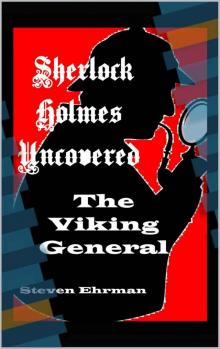 The Viking General (A Sherlock Holmes Uncovered Tale Book 9)
The Viking General (A Sherlock Holmes Uncovered Tale Book 9)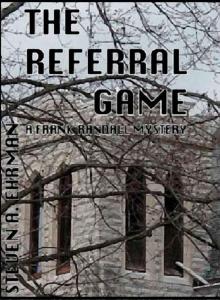 The Referral Game (A Frank Randall Mystery)
The Referral Game (A Frank Randall Mystery) Collection of Four Short Stories
Collection of Four Short Stories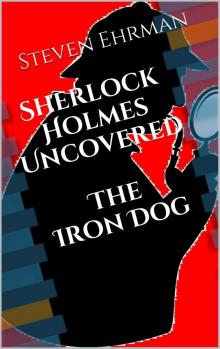 The Iron Dog (A Sherlock Holmes Uncovered Tale)
The Iron Dog (A Sherlock Holmes Uncovered Tale)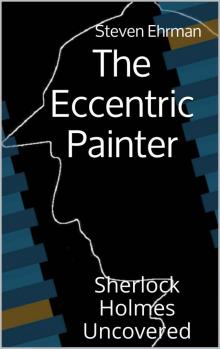 The Eccentric Painter (A Sherlock Holmes Uncovered Tale)
The Eccentric Painter (A Sherlock Holmes Uncovered Tale)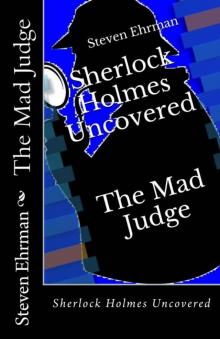 The Mad Judge (A Sherlock Holmes Uncovered Tale Book 3)
The Mad Judge (A Sherlock Holmes Uncovered Tale Book 3)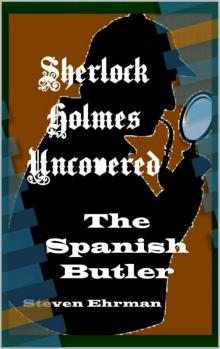 The Spanish Butler (A Sherlock Holmes Uncovered Tale Book 8)
The Spanish Butler (A Sherlock Holmes Uncovered Tale Book 8)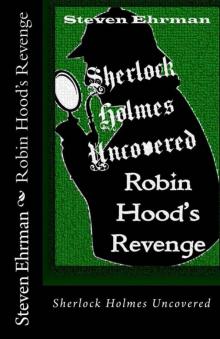 Robin Hood's Revenge (A Sherlock Holmes Uncovered Tale Book 7)
Robin Hood's Revenge (A Sherlock Holmes Uncovered Tale Book 7)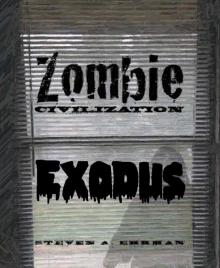 Zombie Civilization: Exodus (Zombie Civilization Saga Book 2)
Zombie Civilization: Exodus (Zombie Civilization Saga Book 2)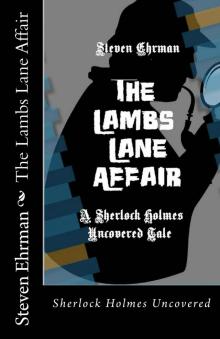 The Lambs Lane Affair (A Sherlock Holmes Uncovered Tale Book 5)
The Lambs Lane Affair (A Sherlock Holmes Uncovered Tale Book 5)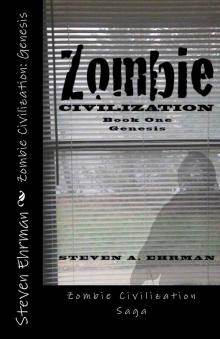 Zombie Civilization: Genesis (Zombie Civilization Saga)
Zombie Civilization: Genesis (Zombie Civilization Saga)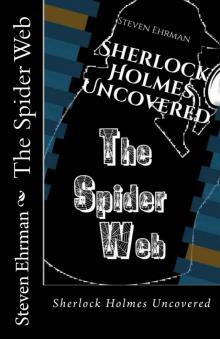 The Spider Web (A Sherlock Holmes Uncovered Tale Book 4)
The Spider Web (A Sherlock Holmes Uncovered Tale Book 4)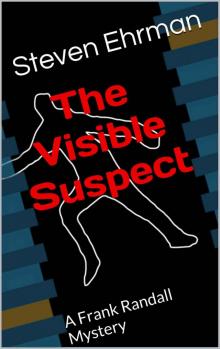 The Visible Suspect (A Frank Randall Mystery)
The Visible Suspect (A Frank Randall Mystery)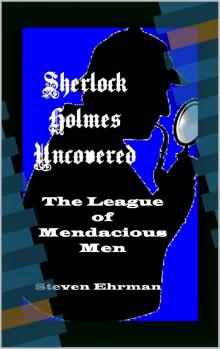 The League of Mendacious Men (A Sherlock Holmes Uncovered Tale Book 10)
The League of Mendacious Men (A Sherlock Holmes Uncovered Tale Book 10)